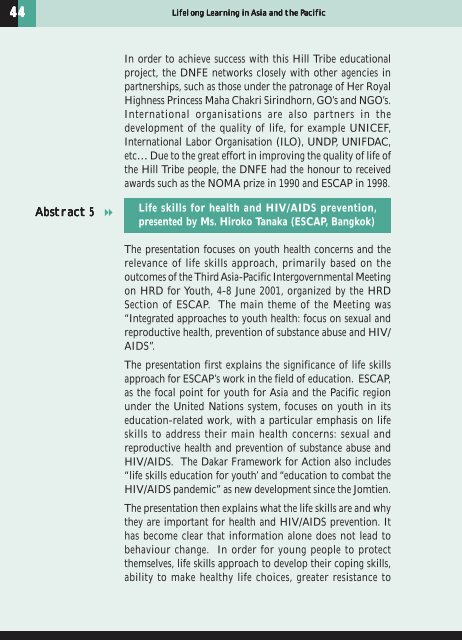Lifelong Learning in Asia and the Pacific
Lifelong Learning in Asia and the Pacific
Lifelong Learning in Asia and the Pacific
Create successful ePaper yourself
Turn your PDF publications into a flip-book with our unique Google optimized e-Paper software.
!<br />
44<br />
44 Lifelo<br />
long <strong>Learn<strong>in</strong>g</strong> <strong>in</strong> <strong>Asia</strong> <strong>and</strong> <strong>the</strong> <strong>Pacific</strong><br />
In order to achieve success with this Hill Tribe educational<br />
project, <strong>the</strong> DNFE networks closely with o<strong>the</strong>r agencies <strong>in</strong><br />
partnerships, such as those under <strong>the</strong> patronage of Her Royal<br />
Highness Pr<strong>in</strong>cess Maha Chakri Sir<strong>in</strong>dhorn, GO’s <strong>and</strong> NGO’s.<br />
International organisations are also partners <strong>in</strong> <strong>the</strong><br />
development of <strong>the</strong> quality of life, for example UNICEF,<br />
International Labor Organisation (ILO), UNDP, UNIFDAC,<br />
etc… Due to <strong>the</strong> great effort <strong>in</strong> improv<strong>in</strong>g <strong>the</strong> quality of life of<br />
<strong>the</strong> Hill Tribe people, <strong>the</strong> DNFE had <strong>the</strong> honour to received<br />
awards such as <strong>the</strong> NOMA prize <strong>in</strong> 1990 <strong>and</strong> ESCAP <strong>in</strong> 1998.<br />
Abstract t 5<br />
Life skills for health <strong>and</strong> HIV/AIDS prevention,<br />
presented by Ms. Hiroko Tanaka (ESCAP, Bangkok)<br />
The presentation focuses on youth health concerns <strong>and</strong> <strong>the</strong><br />
relevance of life skills approach, primarily based on <strong>the</strong><br />
outcomes of <strong>the</strong> Third <strong>Asia</strong>-<strong>Pacific</strong> Intergovernmental Meet<strong>in</strong>g<br />
on HRD for Youth, 4-8 June 2001, organized by <strong>the</strong> HRD<br />
Section of ESCAP. The ma<strong>in</strong> <strong>the</strong>me of <strong>the</strong> Meet<strong>in</strong>g was<br />
“Integrated approaches to youth health: focus on sexual <strong>and</strong><br />
reproductive health, prevention of substance abuse <strong>and</strong> HIV/<br />
AIDS”.<br />
The presentation first expla<strong>in</strong>s <strong>the</strong> significance of life skills<br />
approach for ESCAP’s work <strong>in</strong> <strong>the</strong> field of education. ESCAP,<br />
as <strong>the</strong> focal po<strong>in</strong>t for youth for <strong>Asia</strong> <strong>and</strong> <strong>the</strong> <strong>Pacific</strong> region<br />
under <strong>the</strong> United Nations system, focuses on youth <strong>in</strong> its<br />
education-related work, with a particular emphasis on life<br />
skills to address <strong>the</strong>ir ma<strong>in</strong> health concerns: sexual <strong>and</strong><br />
reproductive health <strong>and</strong> prevention of substance abuse <strong>and</strong><br />
HIV/AIDS. The Dakar Framework for Action also <strong>in</strong>cludes<br />
“life skills education for youth’ <strong>and</strong> “education to combat <strong>the</strong><br />
HIV/AIDS p<strong>and</strong>emic” as new development s<strong>in</strong>ce <strong>the</strong> Jomtien.<br />
The presentation <strong>the</strong>n expla<strong>in</strong>s what <strong>the</strong> life skills are <strong>and</strong> why<br />
<strong>the</strong>y are important for health <strong>and</strong> HIV/AIDS prevention. It<br />
has become clear that <strong>in</strong>formation alone does not lead to<br />
behaviour change. In order for young people to protect<br />
<strong>the</strong>mselves, life skills approach to develop <strong>the</strong>ir cop<strong>in</strong>g skills,<br />
ability to make healthy life choices, greater resistance to

















